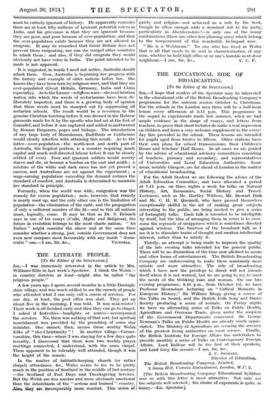THE EDUCATIONAL SIDE OF BROADCASTING.
[To the Editor of the SPECTATOR.] Sitt,—I hope that readers of the Spectator may be interested in the educational side of the British Broadcasting Company's programme for the autumn session October to Christmas. For the schools in the London area there will be a half-hour lesson every afternoon at 3.15 p.m. This programme is the sequel to experiments made last summer, when we had ample evidence in the shape of essays, and letters from teachers, to prove that short lectures do make a real impression on children and form a very welcome supplement to the every- day fare provided in the school. These lessons are intended for pupils aged from twelve to fifteen. Other stations have their own plans for school transmissions, their Children's Hours and Scholars' Half Hours. In all cases we are guided by the advice of educational advisory committees consisting of teachers, primary and secondary, and representatives of Universities and Local Education Authorities. Some areas, notably Glasgow, are far ahead of London in the matter of educational broadcasting.
For the Adult Student we are following the advice of the Adult Education Committee, and have allocated a period at 7.15 p.m. on three nights a week for talks on Natural History, Art., Economics, Social History and Travel. Lecturers, such as Mr. Hartley Withers, Mr. Stewart Dick and Mr. C. H. B. Quennell, who have proved themselves exceptionally skilful in the art of making great subjects interesting to the public, are being invited to give a series of fortnightly talks Each talk is intended to be intelligible by itself, but the idea of arranging them in series is to over- come the reproach of scrappiness which is sometimes directed against wireless. The function of the broadcast talk as I see it is to stimulate trains of thought and awaken intellectual interest, rather than to satisfy it
Thirdly, an attempt is being made to improve the quality of the late evening talks intended for the general public. There will be no diminution of the time now allotted to music and other forms of entertainment. The British Broadcasting Company are endeavouring to make these constantly more artistic and more attractive. The side of broadcasting which I have now the privilege to direct will not intrude itself where it is not wanted, but we are going to try to meet the needs of the thinking man and woman. On our late evening programme, 9.45 p.m., from October 1st, we have Professor Hearnshaw lecturing on "Critical Moments in European History," Sir William Bragg giving a course of Six Talks on Sound, and the British Folk Song and Dance Society producing a series of recitals. On Friday nights we have an alternating series of Talks on Public Health, Agriculture and Overseas Trade, given under the auspices of the Government Departments concerned. Sir George Newman's Talks on Public Health are already much appre- ciated. The Ministry of Agriculture are securing the services of the greatest living authorities on rural science. Finally, the British Institute for Foreign Affairs has undertaken to provide monthly a series of Talks on Contemporary Foreign Affairs. Lord Balfour will be the first of their speakers, and Lord Grey the second.—I am, Sir, &c., J. C. STOBART,
Director of Education. The British Broadcasting Company, Limited,
2 Savoy Hill, Victoria Embankment, London, W.C. 2.
[The British Broadcasting Company Educational Syllabus sent us with this letter is most attractive. Not only arc the subjects well selected ; the choice of exponents is quite as happy.—En. Spectator.]


































 Previous page
Previous page